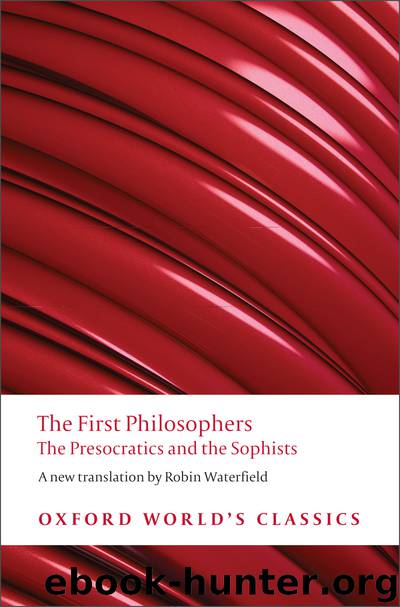First Philosophers by Waterfield Robin;

Author:Waterfield, Robin;
Language: eng
Format: epub
Publisher: Oxford University Press, UK
Published: 2000-12-04T16:00:00+00:00
DIOGENES OF APOLLONIA
Diogenes is something of a throwback—a Milesian kind of philosopher in a post-Parmenidean world. He is also an eclectic, borrowing not just from Anaxagoras and Leucippus (as T1 says, though our evidence for Leucippus is so slight that it is hard for us now to detect his influence), but from Heraclitus too, while his most important debt is to Anaximenes. But he writes clearly, and makes some original contributions. Above all, in F2 he announces his major new insight, which he thinks will allow him to reinstate monism instead of the pluralism of his immediate predecessors. This insight is that unless everything was essentially related (i.e. was made up of the same underlying stuff) nothing could interact and generation would be impossible.1 It makes no sense to Diogenes to say that, for instance, Empedocles’ four elements, randomly thrown together in certain proportions, can make up the things of this world: bone could not grow out of bone unless there was an underlying unity, and bone could not combine with other substances either unless there was an underlying unity. Like Empedocles and Anaxagoras, Diogenes believes that mixture and separation are responsible for the generation and destruction of things, but unlike them he holds that there is no plurality of elements or substances involved in the mixture and separation. It is tempting also to believe that Diogenes was attracted by the simplicity of his system, as opposed to the formidable complexity of Empedocles and Anaxagoras. We have no evidence as to how Diogenes got around the Eleatic strictures about change and motion, but he probably borrowed the concept of void from Leucippus.
Impressed (as Heraclitus and Anaximander were) with the regularity of large-scale events in the universe, Diogenes posited, like Anaxagoras, a guiding intelligence (F3), which he then went on to identify with air, for the reasons given in F4. Air turns out also to be his underlying stuff (F5).2 If air is responsible for life, Diogenes seems to have argued, then it is divine, and since life manifestly displays the workings of intelligence, then air is or has intelligence. Intelligence and warmth are related, presumably because a corpse is cold and has no intelligence. Presumably the most powerful intelligence, that of the divine air itself, is warmest. One may guess, then, that the air close to the sun to which Diogenes refers in F5 is the primary, divine form of air; he may well, then, have been assuming a standard Presocratic universe of concentric spheres of the primary stuffs, with air on the outside controlling the universe as a whole, then fire, then water and earth. The idea that intelligence is warm air, combined with the idea that everything has air in different temperatures, cleverly allows Diogenes to distinguish not just between individuals, but between species, and between animate and (cold) inanimate objects. In T1 Theophrastus reports that Diogenes attributed all different modifications of air to condensation and rarefaction, as Anaximenes had done, but we can see from Diogenes’ own words that different temperature is of prime importance to him.
Download
This site does not store any files on its server. We only index and link to content provided by other sites. Please contact the content providers to delete copyright contents if any and email us, we'll remove relevant links or contents immediately.
The remains of the day by Kazuo Ishiguro(8348)
Tools of Titans by Timothy Ferriss(7757)
Giovanni's Room by James Baldwin(6763)
The Black Swan by Nassim Nicholas Taleb(6731)
Inner Engineering: A Yogi's Guide to Joy by Sadhguru(6417)
The Way of Zen by Alan W. Watts(6263)
Asking the Right Questions: A Guide to Critical Thinking by M. Neil Browne & Stuart M. Keeley(5328)
The Power of Now: A Guide to Spiritual Enlightenment by Eckhart Tolle(5304)
The Six Wives Of Henry VIII (WOMEN IN HISTORY) by Fraser Antonia(5203)
Astrophysics for People in a Hurry by Neil DeGrasse Tyson(4981)
12 Rules for Life by Jordan B. Peterson(4150)
Housekeeping by Marilynne Robinson(4032)
The Ethical Slut by Janet W. Hardy(4018)
Skin in the Game by Nassim Nicholas Taleb(3950)
Double Down (Diary of a Wimpy Kid Book 11) by Jeff Kinney(3887)
Ikigai by Héctor García & Francesc Miralles(3842)
The Art of Happiness by The Dalai Lama(3827)
Skin in the Game: Hidden Asymmetries in Daily Life by Nassim Nicholas Taleb(3707)
Walking by Henry David Thoreau(3667)
